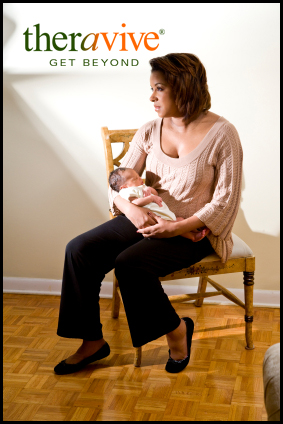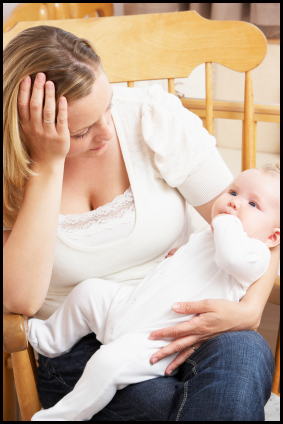 Depression or Baby Blues affects about 80% of new mothers.
Depression or Baby Blues affects about 80% of new mothers.
Postnatal Depression (PND), also known as Postpartum Depression (PPD) can be confusing and frightening. There are three primary types of PND that exist on a continuum. The severity increases as more serious symptoms develop across the continuum.
The Continuum of Depression for New Mothers
On one end of the continuum of PND is Baby Blues. Baby Blues affects about 80% of new mothers. The symptoms show up between the third and tenth day after delivery in most cases. The symptoms include sadness, anxiety, tearfulness and others. These symptoms generally go away without professional intervention. Most new moms who have the support, understanding and encouragement of family and friends seem to recover from Baby Blues spontaneously.
The next level of severity on the continuum is Post Natal Depression. PND includes symptoms of major depressive disorder, such as anxiety, sadness, feelings of hopelessness, sleep disturbance, changes in eating patterns, irritability, loss of energy, feelings of guilt or shame and others. Women with PND may have thoughts of hurting themselves or the baby, which can be very serious. PND affects about 15% of new mothers. That number can be higher among women who are struggling with poverty and related pressures. The incidence of PND in teenage moms is twice as high. The symptoms of PND can occur anytime during the first year after birth.
The most severe form of PND is Postpartum Psychosis. This illness is quite rare, affecting only 1-2 of every 1000 new mothers. The symptoms tend to occur within the first three-four weeks after delivery, and may be quite sudden. The symptoms include delusions (odd thoughts or beliefs), hallucinations (seeing or hearing things that others do not see or hear), mania (decreased need for sleep) and hyperactivity, extreme irritability, paranoia (suspiciousness, mistrust, fear someone/something is out to get you), rapid mood swings and problems communicating at times.
There is a 5% rate of infanticide or suicide for women who have Postpartum Psychosis – the illness can be very dangerous. Women with signs or symptoms of this illness should seek help immediately from a professional. Women who have a history of BiPolar Disorder, a family history of BiPolar Disorder or psychosis are at greatest risk for Postpartum Psychosis. The repeat rate for Postpartum Psychosis is very high – meaning a woman who had this with a previous delivery has about an 80% chance of having it again.
What Causes PND?
There seem to be many contributing factors to PND, and no clear cut answers. There are most likely hormonal and chemical imbalances involved, as well as sleep deprivation and possibly trauma from childbirth. Some women may be more likely to experience some form of PND because of genetic factors. Family history also plays a part, as well as environmental factors. Isolation, lack of support, stress, such as having a demanding baby or financial problems, may also contribute to PND. This may explain the higher rate of PND among teenage moms.
 How to Recognize PND
How to Recognize PND
If you have any of the symptoms listed above for longer than two weeks, you should talk to your medical provider. The exceptions to this are in cases where there are thoughts of harm to the baby or mother, and symptoms of psychosis. In these situations you should seek assistance immediately by contacting your doctor and/or going to the nearest emergency room for help.
It is useful to talk about how you are feeling with friends and family. Talking about things may help you determine if your signs and symptoms are related to sleep deprivation or something more serious. Sleep deprivation can cause many of the same symptoms as PND, so finding a way to take a break and get some much needed rest is crucial.
Postpartum psychosis is difficult to recognize, as the person who is having a break from reality (hearing voices, paranoid, bizarre thoughts) can be very secretive about these symptoms as part of the illness. Those who are close to the new mom should be aware and carefully address any concerns.
Postpartum Psychosis Safety Planning
Because there is a risk of injury or death to the baby or mother with Postpartum Psychosis, any risk factors should be addressed early. If you know that there is a previous or family history of Postpartum Psychosis, it is wise to develop a safety plan with your doctor or psychiatrist before the delivery. A safety plan may include education of partner/spouse about the symptoms and signs of psychosis, what to do if psychosis is suspected and a plan for seeking emergency medical care if needed.
In some cases, such as previous history of postpartum psychosis, developing a relationship with a psychiatrist and/or therapist for regular check-ins may be wise. A prescription for an anti-psychotic medication can be prescribed ahead of time, if appropriate, with instructions to contact the MD immediately if symptoms develop. This type of safety planning is highly recommended in high risk cases.
Treatment During Pregnancy
Some doctors recommend that moms-to-be who have risk factors for PND start taking medication in the last trimester of the pregnancy as a prophylactic measure. There is conflicting information from research studies about the safety of antidepressant medications for pregnant women. The decision to take medication during pregnancy should be carefully evaluated on a case-by-case basis, weighing the safety of the mom and the baby. Antidepressants will not prevent or treat psychosis.
There are some concerns that babies exposed to antidepressants in utero may develop serious health conditions, such as persistent pulmonary hypertension of the newborn (PPHN). Mothers and their medical providers should discuss the risks of PPHN and those associated with untreated depression in women. Untreated depression has been found to result in problems such as low birth weight, pre-term delivery, poor prenatal care, lower Apgar scores and higher rates of infanticide or maternal suicide. Obviously, the issues are complex and require careful consideration.
_________________________________________________________________________________________________________________________________
"Depression During Pregnancy & Postpartum." Depression During Pregnancy & Postpartum. Postpartum Support International. Web. 08 Nov. 2013.
"Seeing Your Doctor." Post and Antenatal Depression Association. Web. 8 Nov. 2013.
"SSRI Safety." FDA. Web. 08 Nov. 2013.
About the Author
 LuAnn Pierce, LCSW
LuAnn Pierce, LCSWI am a clinical social worker, therapist and writer. Currently, I offer online therapy and coaching services to people in Colorado and Wyoming. As a provider for the CO Department of Vocational Rehabilitation and the National MS Society, my expertise in counseling people who have disabilities and chronic illness is considerable. I have written for About.com, DailyRx.com, Theravive.com, GoodTherapy.org, SelfHelpMagazine.com and contribute to several other online health and mental health sites.
Office Location:
19th & Dahlia
Denver, Colorado
80220
United States
Phone: 303-910-2425
Contact LuAnn Pierce, LCSW
Professional Website:
http://HireASocialWorker.com